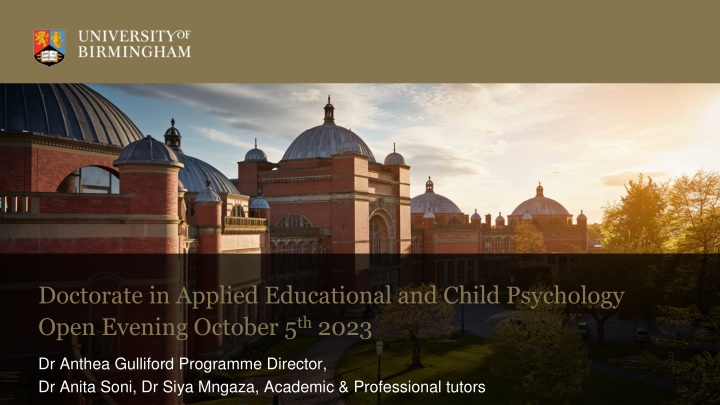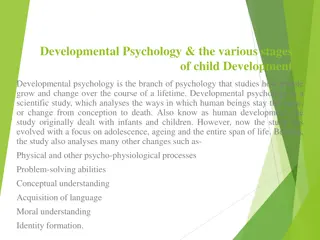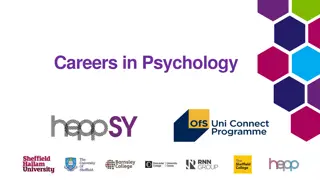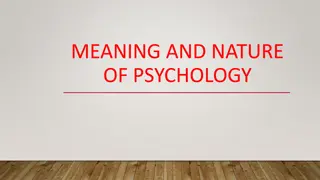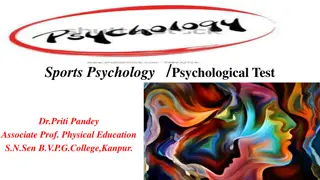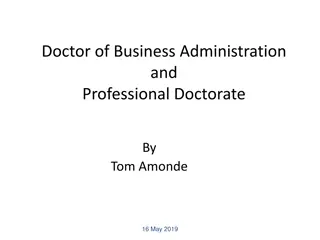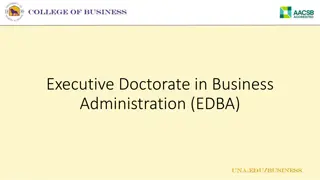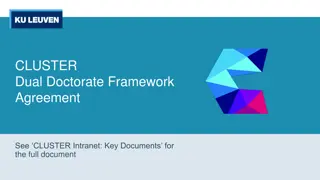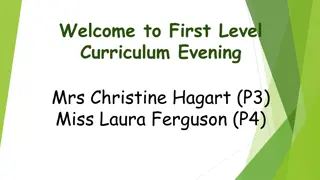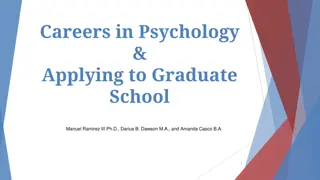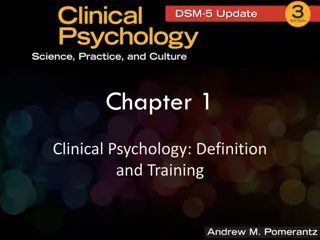Doctorate in Applied Educational and Child Psychology Programme Open Evening
Join the Doctorate in Applied Educational and Child Psychology programme at the University of Birmingham for an insightful open evening on October 5th, 2023. Meet the programme director, Dr. Anthea Gulliford, and academic/professional tutors Dr. Anita Soni and Dr. Siya Mngaza. Learn about educational psychology training, the application process, and more. Note the disclaimer regarding potential 2024 cohort intake and explore resources to discover the educational psychology role.
Download Presentation

Please find below an Image/Link to download the presentation.
The content on the website is provided AS IS for your information and personal use only. It may not be sold, licensed, or shared on other websites without obtaining consent from the author.If you encounter any issues during the download, it is possible that the publisher has removed the file from their server.
You are allowed to download the files provided on this website for personal or commercial use, subject to the condition that they are used lawfully. All files are the property of their respective owners.
The content on the website is provided AS IS for your information and personal use only. It may not be sold, licensed, or shared on other websites without obtaining consent from the author.
E N D
Presentation Transcript
Doctorate in Applied Educational and Child Psychology Open Evening October 5th2023 Dr Anthea Gulliford Programme Director, Dr Anita Soni, Dr Siya Mngaza, Academic & Professional tutors
Welcome! Anthea Gulliford Programme Director; Anita Soni, Siya Mngaza - Academic and Professional Tutors Our TEPs: here to support with information and reflections Our audience A reminder: mics off.
Our aims are to Share information on: o Educational psychology training o The University of Birmingham professional educational psychology training programme o Application process Address questions you may wish to raise Allow you to meet and discuss
Disclaimer We are [As are other universities see AEP website] in contract negotiations for the DfE funding of EP training for a 2024 intake. However, we are not currently formally contracted to provide for a 2024 ITEP cohort intake. Therefore, any information provided at this point is conditional upon that final contract completion. As soon as this is in place, we will inform the Association of Educational Psychologists (AEP) to open EPFT applications for our programme. Meanwhile, our disclaimer is that we cannot at this point in time completely guarantee that our programme will have a 2024 intake and your progression in this process is at your own risk.
Finding out about the EP role British Psychological Society s (BPS) website Association of Educational Psychologists' (AEP) website Social media Twitter, Facebook, see TEPICC, etc Try to find an EP to talk to: EPS Outreach events Reading
Reading Cline, T., Gulliford, A. & Birch, S. (2023) (Eds.) 3rd Edn. Educational Psychology. Topics in Applied Psychology Series. London. Routledge. Journals: Educational Psychology in Practice Educational and Child Psychology
The Birmingham programme The App Ed Ch Psy D is: BPS Accredited. HCPC Approved. NB Graduates are eligible to apply for HCPC registration as a practitioner psychologist educational psychologist is a protected title
Programme Team includes our tutors Dr James Birchwood Dr Katie Callicott Dr Ruth Hewett Dr Julia Howe Dr Nooreen Khan Dr Anita Soni Dr Anjam Sultana Dr Siya Mngaza Course Administrator educationalpsychology@contacts.bham.ac.uk
Where the Programme sits Dept of Inclusion and Special Needs College of Social Science School of Education Applied focus, social systems, wellbeing DISN Ed Psy Programme
DISN, in the School of Education, in the College of Social Science Disability, Inclusion and Special Educational Needs (DISN): a unique department, specialises in research and teaching, seeking to better understand and improve the inclusion of people in education and society more broadly Number of Research Centres in the School of Education: e.g. Autism - ACER; Visual Impairment - VICTAR; Race and Education CRRE etc.
The Birmingham programme Commitment to: Inclusion and belonging Valuing diversity, equality and access Anti-oppressive practice Critical approaches to psychology Understanding the impact of structure and community on education Application of theory to practice
Programme structure Reflects the integration of theory, practice and research knowledge and skill in EP role, informed by: Modular learning Critical psychology Scientist practitioner Values Professional learning Research learning
Note The programme is subject to change and evolution. Our current model is shared below. Programme always compliant with BPS requirements
Modules Y1, and extension in Ys 2 and 3 Title - approx. Content e.g. Problem-solving models, consultation Psychology in Professional Practice Paradigms in assessment, approaches, therapeutic interventions Assessment and Intervention Consultancy skills, systems work, Action Research, intervention projects Working with Organisations and Communities Learners with more complex needs Complex Individual Needs Underpinnings to research paradigms Research: philosophy Development of research in practice Research: design Development of skills in data collection Research: qualitative methods
Modules Cover and link all aspects of practice and theory A broad range of theories and approaches In the training process, trainees to begin to construct themselves as practitioners We aim to help you to explore your values, and develop critical reflection and challenge, to help you to practice in an informed way
Placements Year Length Location Focus 1 FWA & FWB ~ 60 days West Midlands usually Core skills, foundational learning 2 130 days WM or Consortium* Extending skills, building familiarity with EPS demands and contexts 3 130 days WM or Consortium Consolidation, fluency, towards reaching competencies.
Research Y Component Supports 1 Core research knowledge and skills: planning Research modules 2 Plan thesis, student-led choice Main thesis (Vol 1) Professional Practice Reports (Vol 2) PPRs draw on professional practice Incremental growth in skills 3 Main thesis (Vol 1) Professional Practice Reports (Vol 2 Completion!
Assessments Modular learning Assignments Placement learning Portfolio Portfolio Research learning Y1 Y2 Assignments Two Professional Practice Reports (PPRs); thesis begun One PPR; thesis completed Y3 Portfolio
Processes for learning and support Modular learning supported in cohort, and groupwork Modules led by convenors Tutor support: academic learning, research, and professional placement. Placement supervisors EPS Tutorials 1:1 and group supervision Workshops Peer support and supervision and collaborative learning Evaluation
Practical details: Typical Year 1 October ~ March: Mondays and Tuesdays taught sessions in the university Wednesdays and Thursday placement in the West midlands Fridays normally a study day April ~ July: 10 week block placement 3 days pw Taught sessions Written assignments to gain 180 credits towards the doctorate
Course structure: Years 2 and 3 130 days on Placement Taught sessions at the University (Y2: 3 days a month; and Y3: 3 days a half term) Spiral curriculum building on and extending the learning from Y1 Academic work thesis which is a combination of research and writing about practice (Vol 1 and Vol 2)
BPS Accreditation 2023 Programme leadership Anti-oppressive practise is integral to teaching and learning Trailblazing approach to Developing Supervision Champions The Head of School s explicit and vital support of the programme.
The Birmingham programme: some USPs NB: core curriculum required, for all programmes Anti-oppressive practice: ethos, theory and practice Skills in working with systems: organisations and community Applied psychology in practice: interventions Understanding interactions in consultation Flexibility in research: support for adult learning, motivation/choice Individualised support close working relationships with tutors Diversity in our Team: personal and professional Etc.. Evolution: response to evolving demands of EP role, and context staff skills
Applications Competition is high over 300 applications for ~18 or more places Applicants need to meet basic criteria - a qualification in psychology and work experience in a relevant area We shortlist using a scoring system So
Qualifications Qualification in Psychology that confers the Graduate Basis for Chartered Membership (GBC) this could be an undergraduate degree, a conversion course or a postgraduate course. Good honours degree, upper second or above Or a further PG degree to supplement 2:2 e.g. Diploma or MSc (latter is the preferable minimum) A 2:2 alone does not suffice
Experience One year s paid full-time employment (or equivalent) in a relevant area Examples: Teaching Assistant, Learning Mentor, Assistant EP, Teacher, social care, youth justice, etc Taking sustained responsibility for an aspect of children s development
Access and EDI We welcome, value, and embrace diversity in our trainees and tutor team, such as differences in cultural backgrounds, race, ethnicity, Disability, age, class, religion or belief, sex, gender identity, or sexual orientation. Support arrangements can be made: guided by student and DSA support. Reasonable adjustment plans are created to support need.
Funding DfE pays fees all three years Y1 DfE bursary, paid monthly, currently 15,950 Y2 and 3: bursary funded by placement host, 19,960 *+ IK travel *Matched to Soulbury employment income TEP scale point 1 Note: no unfunded placements. If you are or have worked abroad recently please check the residency requirements on the AEP website if you do not meet these we cannot offer you a place on the course
What are we looking for? Check AEP guidance A good knowledge and understanding of psychology Use of psychological knowledge to inform practice Insight into EP role
What are we looking for? And Knowledge of the education system Helpful to have some experience of undertaking (small scale) research
Selection process Attend for one day (dates tbc) o Interview with panel of two o Small group task o A written task on the day
And pause! Some discussion - and your questions?
And finally - please help us to help you! An evaluation link is in the chat Please complete the very short form if you are able! Many thanks! We look forward to meeting some of you at interview!
